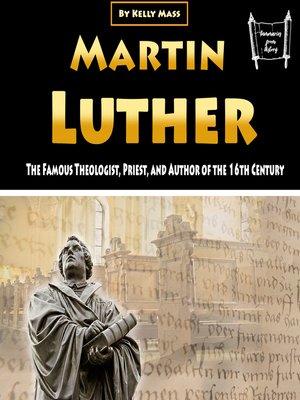Martin Luther
audiobook (Unabridged) ∣ The Famous Theologist, Priest, and Author of the 16th century
By Kelly Mass

Sign up to save your library
With an OverDrive account, you can save your favorite libraries for at-a-glance information about availability. Find out more about OverDrive accounts.
Find this title in Libby, the library reading app by OverDrive.



Search for a digital library with this title
Title found at these libraries:
| Library Name | Distance |
|---|---|
| Loading... |
Martin Luther was a German theologian, priest, author, composer, and previous Augustinian monk who is best recalled as a key figure in the Protestant Reformation and the creator of Lutheranism.
In the year 1507, Luther was ordained as a priest. He came to oppose certain Roman Catholic Church theories and practices, specifically the perspective on extravagances. In his Ninety-five Theses of 1517, Luther advised a scholastic evaluation of the practice and effectiveness of extravagances. His rejection to disavow all of his publications at the demand of Pope Leo X in the year 1520 and the Holy Roman Emperor Charles V at the Diet Plan of Worms in the year 1521 culminated in the pope's excommunication and the Holy Roman Emperor's condemnation as a hooligan.
Luther preached that redemption and, consequently, immortality aren't won through greats, but are only gotten as a completely free gift of God's grace through a follower's faith in Jesus Christ as sin's redeemer. By preaching that the Bible is the only source of divinely given knowledge, his faith assaulted the pope's power and office, and he battled sacerdotalism by thinking all baptized Christians to be a holy priesthood. Lutherans are the ones who relate to them, and all of Luther's more comprehensive ideas, while Luther demanded Christian or Evangelical as the sole acceptable classifications for anybody who proclaimed Christ.
His translation of the Bible into the German vernacular (instead of Latin) made it more available to the laypersons, a substantial event in both the church and German culture.
This and many other things did Martin Luther do, all of which were key elements of the reformation of the church and the beginning of protestant denominations.







